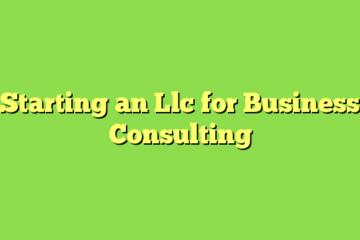Are you ready to turn your passion for embroidery into a successful business? Starting an LLC for your embroidery business is a practical and strategic move.
In this article, we will guide you through the essential steps of:
- Choosing a business name
- Registering your LLC
- Obtaining necessary licenses and permits
- Setting up your business structure
- Understanding tax and legal obligations
Get ready to embark on a journey towards building a thriving embroidery business!
Choose a business name that reflects your brand and appeals to your target market, while avoiding trademark conflicts or similar names. Complete necessary paperwork and submit it to the appropriate government agency to register your LLC. Obtain the necessary licenses and permits, such as zoning permits and health department licenses, to ensure your business meets legal requirements. Choose the appropriate business structure, such as forming an LLC, to protect personal assets and optimize tax benefits.
Choosing a Business Name
When starting an LLC for your embroidery business, you need to carefully choose a business name that reflects your brand and appeals to your target market. The business name is the first impression your potential customers will have of your brand, so it’s crucial to make it memorable and engaging.
To come up with creative branding ideas, you should consider the nature of your embroidery business and the unique qualities that set you apart from your competitors. Think about what makes your embroidery services special and how you can convey that through your business name.
Market research plays a vital role in choosing the right business name. By conducting thorough market research, you can gain valuable insights into your target market’s preferences and expectations. This will help you understand the language, imagery, and symbolism that resonate with your potential customers. Incorporating these elements into your business name can make it more appealing and relatable to your target audience.
Additionally, market research can also uncover any potential trademark conflicts or existing businesses with similar names. Avoiding such conflicts will save you from legal troubles in the future.
Registering Your LLC
To register your LLC for your embroidery business, you’ll need to complete the necessary paperwork and submit it to the appropriate government agency. Registering your LLC is an important step in establishing your business as a legal entity. It provides you with liability protection and allows you to conduct business under a recognized name.
To begin the registration process, you’ll need to create a business plan. This document outlines your goals, strategies, and financial projections for your embroidery business. It’s essential for attracting investors, securing loans, and guiding your business decisions.
Next, you’ll need to find suppliers for your embroidery supplies and equipment. Research different suppliers to find the ones that offer quality products at competitive prices. Consider factors such as reliability, customer service, and shipping options when making your decision.
Once you have your business plan and suppliers in place, you can proceed with the LLC registration. Contact your state’s Secretary of State office or visit their website to obtain the necessary forms and instructions. Fill out the forms accurately and pay any required fees. Submit the completed paperwork to the appropriate government agency, and await confirmation of your LLC registration.
Obtaining Necessary Licenses and Permits
To ensure compliance with legal regulations, you’ll frequently need to obtain necessary licenses and permits for your embroidery business. Applying for zoning permits and obtaining health department licenses are two important steps in this process.
When it comes to zoning permits, you’ll need to check with your local government or municipality to determine the specific requirements for your area. Zoning permits ensure that your business location is suitable for the type of activities you’ll be conducting. This may involve verifying that your chosen location is zoned for commercial use and meets any other applicable regulations.
Obtaining health department licenses is crucial to ensure that your embroidery business meets health and safety standards. Depending on your location, you may need to apply for a food establishment license if you plan to offer food or beverages to your customers. Even if you don’t plan on serving food, you may still need other health department licenses, such as a general business license or a permit for handling textiles.
It is important to research and understand the specific licenses and permits required for your embroidery business. Contact your local government agencies or consult with a business attorney to ensure that you’re in compliance with all necessary regulations. By obtaining the appropriate licenses and permits, you can operate your embroidery business smoothly and legally.
Setting Up Your Business Structure
You will need to choose the appropriate business structure for your embroidery business. Determining liability and considering the benefits of forming an LLC are essential factors to consider.
When setting up your business structure, it’s crucial to evaluate the level of personal liability you’re willing to assume. As a business owner, you want to protect your personal assets and limit your liability in case of any legal issues or debts. Forming a Limited Liability Company (LLC) can provide you with this protection.
One of the main benefits of forming an LLC for your embroidery business is the limited personal liability it offers. This means that your personal assets, such as your home or car, are generally protected from being used to satisfy the business’s debts or legal obligations. Your liability is limited to the amount of money you have invested in the business.
Additionally, an LLC provides flexibility in terms of management and tax benefits. You have the freedom to choose how you want to manage your business and can elect to be taxed as a sole proprietorship, partnership, or even a corporation. This allows you to optimize your tax situation and potentially save money.
Understanding Tax and Legal Obligations
When considering the tax and legal obligations for your embroidery business, it’s important to understand the specific requirements and responsibilities that come with operating as an LLC. As an LLC, you’ll have certain tax advantages and obligations that differ from other business structures.
One of the benefits of being an LLC is the ability to take advantage of tax deductions. These deductions can include expenses related to your embroidery business, such as the cost of materials, equipment, and even advertising. It’s crucial to keep detailed records of these expenses so that you can accurately claim them when it comes time to file your taxes.
Another important aspect of understanding tax and legal obligations as an LLC is understanding sales tax. As an embroidery business, you’ll likely be selling your products to customers. Depending on your location, you may be required to collect sales tax on these sales. It’s essential to research and understand the sales tax laws in your state to ensure that you’re compliant. Failure to collect and remit sales tax properly can result in penalties and fines.
It’s advisable to consult with a tax professional or accountant to ensure that you’re meeting all of your tax obligations as an LLC. By understanding and fulfilling your tax and legal obligations, you can ensure the success and longevity of your embroidery business.
Frequently Asked Questions
What Are the Best Embroidery Machines for a Small Embroidery Business?
When starting your LLC for an embroidery business, consider the best embroidery machine brands such as Brother, Janome, and Singer. Features to consider include hoop size, stitching speed, and built-in designs.
How Do I Market My Embroidery Business to Attract Customers?
To market your embroidery business and attract customers, utilize social media advertising to reach a wider audience. Additionally, attend networking events to establish connections within the industry and gain potential clients.
Can I Start an Embroidery Business From Home or Do I Need a Separate Commercial Space?
You can start a home-based embroidery business, but it’s important to consider if you have enough space for the equipment and supplies. If not, you may need a separate commercial space.
What Types of Insurance Do I Need to Protect My Embroidery Business?
To protect your embroidery business, you’ll need business liability insurance and property insurance. Business liability insurance covers potential lawsuits, while property insurance safeguards your physical assets. It’s crucial to have both for comprehensive protection.
How Do I Price My Embroidery Products and Services to Ensure Profitability?
To ensure profitability in pricing your embroidery products and services, consider using different pricing strategies such as cost-plus or market-based pricing. Conduct a competition analysis to understand market rates and adjust your prices accordingly.
Conclusion
So there you have it!
Starting an LLC for your embroidery business may seem like a daunting task, but with the right preparation and knowledge, you can set yourself up for success.
Remember to choose a catchy business name, register your LLC, obtain the necessary licenses and permits, and set up your business structure.
And don’t forget about your tax and legal obligations.
By following these steps, you’ll be well on your way to running a successful embroidery business.
Good luck!
This article is created with the aid of automated technology and then carefully reviewed and verified for accuracy by our professional editors.








